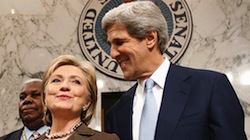Clinton, Tauscher Brief Senators on New START
April 28, 2010
Featured Image
Today's top nuclear policy stories, with excerpts in bullet form.
Stories we're following today, Wednesday, April 28, 2010:
Over Breakfast, Clinton and Tauscher Brief on START - Josh Rogin for The Cable [link]
- In another sign of the State Department's dedication to getting the new START treaty ratified this year, Secretary of State Hillary Clinton hosted top senators and staff for breakfast Tuesday morning in her private Foggy Bottom digs.
- Clinton and Under Secretary Ellen Tauscher spoke and answered questions for 90 minutes about the new pact with Russia. Chief negotiator Rose Gottemoeller, State's congressional affairs chief Richard Verma, the Pentagon's James N. Miller, and the National Security Council's Gary Samore were also there. The congressional side included about a dozen Senate Foreign Relations Committee members and their aides.
- The message was: "This treaty is good for national security," our inside sources reported, adding that Clinton wasn't supposed to stay the whole time but extended her appearance because she wanted to make sure she addressed all the questions posed thoroughly.
- The SFRC is setting up hearings now, with the chairs of the Strategic Posture Commission, former Defense Secretaries James Schlesinger and William Perry, up first on Thursday.
New START and the Obama Nuclear Agenda - Ret. Lt. Gen. Robert G. Gard, Jr. and John Isaacs for the Huffington Post [link]
- On April 8th, President Obama joined Russian President Medvedev in Prague to sign a legally binding New START treaty to replace the 1991 Strategic Arms Reduction Treaty (START I), which expired last year.
- [New START] includes verification procedures to promote confidence that both countries will comply with the treaty. President Ronald Reagan once said, "trust but verify," and that dictum remains valid today.
- Some advocates of missile defense claim that Russian reservations will cause the administration to hold back on deploying promising missile defense systems. They seem to forget that the Soviet Union warned that it would cancel participation in the 1991 treaty if the U.S. opted out of the Anti-Ballistic Missile treaty; we did, but they did not.
- New START is just that: a start. Despite the end of the U.S.-Soviet competition, the remaining 23,000 nuclear bombs across the globe present a clear and present danger to U.S. security.
Analysis--Iran Hardliners in Control, but Still Nervous - Reuters [link]
- Iran's hardline rulers are keeping a tight grip on internal opposition and milking the nuclear standoff with the West to rally nationalist support, but hardly exude confidence that they enjoy wide popular backing.
- A moderate former senior Iranian official said hardliners manipulated the nuclear row to divert attention from domestic repression in the world's fifth biggest oil exporter.
- The U.N. Security Council is unlikely to target Iranian petrol imports in any fourth round of sanctions over Tehran's nuclear programme, but the government can seize on any punitive measures or talk of military options to bolster its standing.
- The opposition will feel constrained to spend time rejecting sanctions and foreign interference instead of focusing on criticising the government, said University of Hawaii's Farideh Farhi.
- "In contrast, sanctions and threats of war are perfect discursive tools for hardliners in their constant 'You are either with us or with them' drumbeat."
Flexibility, Thy Name is New START - Nukes of Hazzard [link]
- Now that the [New START] treaty text and protocol have been released, the amount of flexibility that the treaty allows for is truly astounding.
- Of course, this won’t stop some critics from saying that the treaty could endanger the triad, that it disproportionately benefits Russia, and/or that it limits U.S. prompt global strike capabilities.
- There is flexibility galore, and DoD could go in any one of numerous different directions to meet the treaty’s limits on delivery vehicles. In fact, the U.S. could probably get away with not having to physically destroy a single launcher; it could simply convert its way below the limits.
- This doesn’t mean that the reductions wouldn't be "real," but remember that this treaty was never about deep reductions in the first place. Predictability and stability are its calling cards.
- What this all adds up to is that New START is a huge win for U.S. security. Our entire military leadership strongly supports it. It should be a no brainer in the Senate.
A View from the Dark Side
Folding Our Nuclear Umbrella - John Bolton in the Washington Times [link]
- Bad as Obama policies are for America, they are equally dangerous for friends who have relied for decades on the U.S. nuclear umbrella as a foundation of their own national security strategies.
- As Washington's capabilities decline and as it narrows the circumstances when it will use nuclear weapons, allies are asking hard questions about whether the U.S. nuclear umbrella will continue to provide the protection it has previously.
- Many allies see clearly that our mutual global adversaries have no intention of reducing their own nuclear programs in imitation of Mr. Obama.
- Ironically, therefore, it is America's friends that might increase nuclear proliferation, not just their mortal foes.



